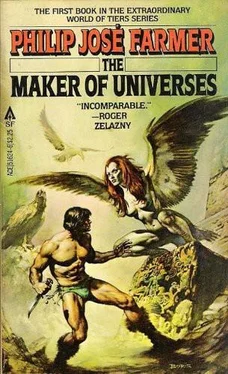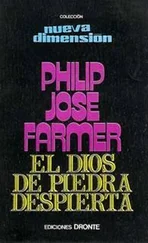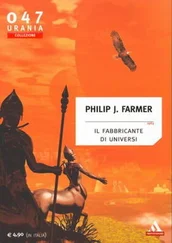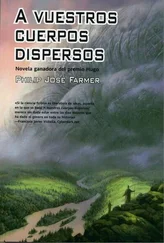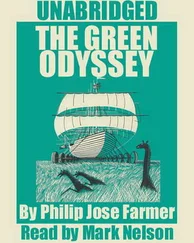“His name is Diskibibol, and the other is Smeel,” Kickaha said.
“Smeel must have drowned,” Wolff said. “Even if he could swim, the water-dragons might have gotten him. But he can’t swim.”
Wolff thought of the horn lying in the muck at the bottom of the moat. “Apparently no one saw Smeel fall. So the horn’s safe there, for the time being.”
The gworl spoke. Although he used German, he could not master the sounds accurately. His words grated deep in the back of his throat. “You will die, humans. The Lord will win; Arwoor is the Lord; he cannot be defeated by filth such as you. But before you die, you will suffer the most… the… the most…”
He began coughing, threw up blood, and continued to do so until he was dead.
“We’d better get rid of his body,” Wolff said. “We might have a hard time explaining what he was doing here. And von Elgers might connect the missing horn with their presence here.”
A look out of the window showed him that the search party was far down the trail road leading to the town. For the moment, at least, no one was on the bridge. He lifted the heavy corpse up and shoved it out the window. After Kickaha’s wound was bandaged, Wolff and the Yidshe wiped up the evidences of the struggle.
Only after they were through did funem Laksfalk speak. His face pale and grim. “That was the horn of the Lord. I insist that you tell me how it got here and what your part is in this… this seeming blasphemy.”
“Now’s the time for the whole truth,” Kickaha said. “You tell him, Bob. For once, I don’t feel like hogging the conversation.”
Wolff was concerned for Kickaha, for his face, too, was pale, and the blood was oozing out through the thick bandages. Nevertheless, he told the Yidshe what he could as swiftly as possible.
The knight listened well, although he could not help interjecting questions frequently or swearing when Wolff told him something particularly amazing.
“By God,” he said when Wolff seemed to be finished, “this tale of another world would make me call you a liar if the rabbis had not already told me that my ancestors, and those of the Teutons, had come from just such a place. Then there is the Book of the Second Exodus, which says the same thing and also claims that the Lord came from a different world.
“Still, I had always thought these tales the stuff that holy men, who are a trifle mad, dream up. I would never have dreamed of saying so aloud, of course, for I did not want to be stoned for heresy. Also, there’s always the doubt that these could be true. And the Lord punishes those who deny him; there’s no doubt of that.
“Now, you put me in a situation no man could envy. I know you two for the most redoubtable knights it has ever been my fortune to encounter. You are such men as would not lie; I would stake my life on that. And your story rings true as the armor of the great dragon-slayer, fun Zilberbergl. Yet, I do not know.”
He shook his head. “To seek to enter the citadel of the Lord himself, to strike against the Lord! That frightens me. For the first time in my life, I,Leyb funem Laksalk, admit that I am afraid.”
Wolff said, “You gave your oath to us. We release you but ask that you do as you swore. That is, you tell no one of us or our quest.”
Angrily, the Yidshe said, “I did not say I would quit you! I will not, at least not yet. There is this that makes me think you might be telling the truth. The Lord is omnipotent, yet his holy horn has been in your hands and those of the gworl, and the Lord has done nothing. Perhaps…”
Wolff replied that he did not have time to wait for him to make up his mind. The horn must be recovered now, while there was the opportunity. And Chryseis must be freed at the first chance. He led them from the room and into another, unoccupied at the moment. There they took three swords to replace theirs, which the gworl must have cast out of the window into the moat. Within a few minutes, they were outside the castle and pretending to search through the woods for the gworl.
By then most of the Teutons outside had returned to the castle. The three waited until the stragglers decided that no gworl were around. When the last of these had gone across the drawbridge, Wolff and his friends put out their torches. Two sentries remained at the guardhouse by the end of the bridge. These, however, were a hundred yards distant and could not see into the shadows where the three crouched. Moreover, they were too busy discussing the events of the night and looking into the darkness of the woods. They were not the original sentries, for these had been killed by the gworl when they had made their dash for freedom across the bridge.
“The point just below our window should be where the horn is,” Wolff said. “Only…”
“The water-dragons,” Kickaha said. “They’ll have dragged off Smeel and Diskibibol’s bodies to their lairs, wherever those are. But there might be some others cruising around. I’d go, but this wound of mine would draw them at once.”
“I was just talking to myself,” Wolff said. He began to take off his clothes. “How deep’s the moat?”
“You’ll find out,” Kickaha said.
Wolff saw something gleam redly in the reflected light from the distant bridge torches. An animal’s eyes, he thought. The next moment, he and the others were caught within something sticky and binding. The stuff, whatever it was, covered his eyes and blinded him.
He fought savagely but silently. Though he did not know who his assailants were, he did not intend to arouse the castle people. However the struggle came out, the issue did not concern them; he knew that.
The more he thrashed, the tighter the webs clung to him and bound him. Eventually, raging, breathing hard, he was helpless. Only then did a voice speak, low and rasping. A knife cut the web to leave his face exposed. In the dim light of the distant torches, he could see two other figures wrapped in the stuff and a dozen crooked shapes. The rotten-fruit stench was powerful.
“I am Ghaghrill, the Zdrrikh’agh of Abbkmung. You are Robert Wolff and our great enemy Kickaha, and the third one I do not know.”
“The Baron funem Laksfalk!” the Yidshe said. “Release me, and you will soon find out whether I am a good man to know or not, you stinking swine!”
“Quiet! We know you have somehow slain two of my best killers, Smeel and Diskibibol, though they could not have been so fierce if they allowed themselves to be defeated by such as you. We saw Diskibibol fall from where we hid in the woods. And we saw Smeel jump with the horn.”
Ghaghril paused, then said, “You, Wolff, will go after the horn into the waters and bring it back to us. If you do, I swear by the honor of the Lord that we will release all three of you. The Lord wants Kickaha, too, but not as badly as the horn, and he said that we were not to kill him, even if we had to let him go to keep from killing him. We obey the Lord, for he is the greatest killer of all.”
“And if I refuse?” Wolff said. “It is almost certain death for me with the water-dragons in the moat.”
“It will be certain death for you if you don’t.”
Wolff considered. He was the logical choice, he had to admit. The quality and relationship of the Yidshe was unknown to the gworl, so they could not let him go after the horn; he might fail to return. Kickaha was a prize second only to the horn. Besides, he was wounded, and the blood from the wound would attract the water-monsters. Wolff, if he cared for Kickaha, would return. They could not, of course, be sure of the depth of his feelings for Kickaha. That was a chance they would have to take.
One thing was certain. No gworl was about to venture into such deep water if he had someone else to do it for him.
Читать дальше
